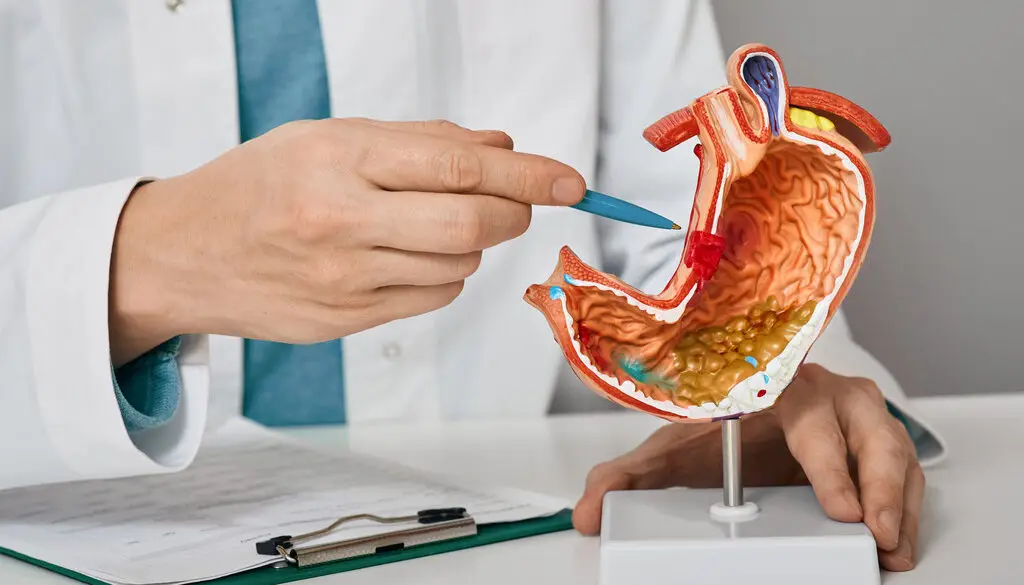Digestive health plays a vital role in our overall well-being. When our digestive system is not functioning properly, it can affect our energy, mood, and daily comfort. Many people experience digestive issues at some point in their lives — from mild problems like indigestion to more serious conditions like ulcers or inflammatory bowel disease. Understanding these common digestive disorders and their symptoms can help in early diagnosis and treatment.

If you have frequent stomach discomfort, bloating, heartburn, or changes in bowel habits, it might be time to see a gastroenterology specialist dubai. These medical experts are trained to diagnose and treat all kinds of digestive conditions, helping patients maintain a healthy gut and improve their quality of life.
In this article, we’ll explore some of the most common digestive disorders, their causes, symptoms, and available treatment options.
1. Gastroesophageal Reflux Disease (GERD)
Overview:
GERD, or acid reflux, is one of the most common digestive disorders worldwide. It occurs when stomach acid flows back into the esophagus — the tube that connects your mouth to your stomach. This backflow causes irritation and the familiar burning sensation known as heartburn.
Common Symptoms:
- Burning feeling in the chest (heartburn), especially after meals
- Sour taste in the mouth
- Difficulty swallowing
- Chronic cough or sore throat
Causes:
GERD can be caused by a weak lower esophageal sphincter (LES), which fails to close properly. It can also be triggered by lifestyle habits such as overeating, smoking, obesity, or consuming spicy and fatty foods.
Treatment Options:
Treatment may include lifestyle changes, such as eating smaller meals, avoiding late-night eating, and reducing trigger foods. Medications that reduce stomach acid can also be prescribed. In severe cases, surgical procedures might be considered to strengthen the LES.
2. Irritable Bowel Syndrome (IBS)
Overview:
IBS is a chronic condition that affects the large intestine. It is not life-threatening but can cause long-term discomfort and affect daily activities.
Common Symptoms:
- Abdominal pain or cramps
- Bloating and gas
- Diarrhea, constipation, or alternating between both
- Feeling of incomplete bowel movement
Causes:
The exact cause of IBS isn’t fully known, but it is often linked to stress, hormonal changes, certain foods, and imbalances in gut bacteria. It tends to be more common in women and may flare up during periods of stress or hormonal shifts.
Treatment Options:
Managing IBS involves dietary changes, stress management, and sometimes medication. Avoiding trigger foods such as caffeine, dairy, and high-fat meals can help. Some patients benefit from fiber supplements or probiotics to maintain gut balance.
3. Peptic Ulcers
Overview:
Peptic ulcers are open sores that develop on the inner lining of the stomach or the upper part of the small intestine. They cause burning pain and discomfort, especially when the stomach is empty.
Common Symptoms:
- Burning stomach pain
- Nausea or vomiting
- Loss of appetite
- Unexplained weight loss
Causes:
The most common cause is an infection by Helicobacter pylori (H. pylori) bacteria. Long-term use of nonsteroidal anti-inflammatory drugs (NSAIDs), such as ibuprofen, can also damage the stomach lining and lead to ulcers.
Treatment Options:
Ulcers are treated with antibiotics to eliminate H. pylori and medications that reduce stomach acid. Avoiding NSAIDs and reducing alcohol intake can also prevent further irritation.
4. Gallstones
Overview:
Gallstones are solid deposits that form in the gallbladder, a small organ that stores bile. They can block the flow of bile and cause pain, infection, or inflammation.
Common Symptoms:
- Sudden and intense pain in the upper right abdomen
- Pain between shoulder blades or right shoulder
- Nausea and vomiting
- Indigestion, especially after fatty meals
Causes:
Gallstones form when bile contains too much cholesterol or bilirubin, or when the gallbladder doesn’t empty properly. Risk factors include obesity, pregnancy, rapid weight loss, and certain dietary habits.
Treatment Options:
Mild cases can be managed with diet changes and medication. However, if gallstones cause frequent pain or complications, surgical removal of the gallbladder (cholecystectomy) is often recommended.
5. Celiac Disease
Overview:
Celiac disease is an autoimmune disorder where the immune system reacts to gluten — a protein found in wheat, barley, and rye. This reaction damages the lining of the small intestine and affects nutrient absorption.
Common Symptoms:
- Diarrhea or constipation
- Abdominal pain and bloating
- Fatigue and weight loss
- Nutrient deficiencies (such as anemia or bone weakness)
Causes:
The condition is genetic and triggered by gluten consumption. When people with celiac disease eat gluten, their immune system attacks the small intestine’s lining, leading to inflammation and damage.
Treatment Options:
The only effective treatment is a strict gluten-free diet. By avoiding foods containing wheat, barley, and rye, most patients can control symptoms and heal intestinal damage over time.
6. Inflammatory Bowel Disease (IBD)
Overview:
IBD refers to chronic inflammatory conditions of the digestive tract, mainly Crohn’s disease and ulcerative colitis. These are serious diseases that can cause long-term damage to the intestines if not treated properly.
Common Symptoms:
- Persistent diarrhea
- Abdominal pain and cramping
- Blood in stool
- Fatigue and weight loss
Causes:
The exact cause is unclear but involves an abnormal immune response, genetic factors, and environmental triggers. It is not caused by stress or diet, though these factors can worsen symptoms.
Treatment Options:
Treatment aims to reduce inflammation and manage symptoms. Medications such as anti-inflammatory drugs, immune system suppressors, and biologics are often prescribed. In some cases, surgery may be needed to remove damaged sections of the intestine.
7. Constipation
Overview:
Constipation is a very common digestive issue where bowel movements become less frequent or difficult to pass. It’s often temporary but can become chronic if left untreated.
Common Symptoms:
- Fewer than three bowel movements a week
- Hard or dry stools
- Straining during bowel movements
- Feeling of incomplete evacuation
Causes:
Constipation can result from dehydration, lack of fiber, lack of exercise, certain medications, or ignoring the urge to pass stool. It can also be a symptom of an underlying digestive condition.
Treatment Options:
Increasing water and fiber intake, exercising regularly, and maintaining a consistent toilet routine can help. Laxatives may be used under medical supervision if lifestyle changes don’t work.
8. Lactose Intolerance
Overview:
Lactose intolerance is the inability to digest lactose, a sugar found in milk and dairy products. It occurs when the small intestine doesn’t produce enough of the enzyme lactase.
Common Symptoms:
- Bloating and gas after consuming dairy
- Stomach cramps
- Diarrhea or nausea
Causes:
This condition is often genetic and more common in adults. It can also occur after intestinal infections or diseases that affect the small intestine.
Treatment Options:
Avoiding lactose-containing foods or using lactose-free dairy products is the best approach. Some people can tolerate small amounts of dairy, especially when eaten with other foods.
9. Pancreatitis
Overview:
Pancreatitis is inflammation of the pancreas, an organ that helps with digestion and blood sugar control. It can be acute (sudden) or chronic (long-term).
Common Symptoms:
- Severe abdominal pain
- Nausea and vomiting
- Fever and rapid heartbeat
- Unexplained weight loss (in chronic cases)
Causes:
The most common causes include gallstones, heavy alcohol use, certain medications, and high levels of triglycerides in the blood.
Treatment Options:
Treatment depends on the cause but often includes hospitalization, IV fluids, pain management, and dietary changes. In chronic cases, patients may need enzyme supplements to aid digestion.
When to See a Gastroenterology Specialist
Digestive problems should not be ignored, especially if symptoms persist for more than a few days or interfere with daily life. You should consider consulting a gastroenterology specialist in Dubai if you experience:
- Ongoing abdominal pain or bloating
- Unexplained weight loss
- Blood in stool or dark-colored stools
- Difficulty swallowing
- Chronic heartburn or acid reflux
- Frequent constipation or diarrhea
Early diagnosis and treatment can prevent complications and help maintain long-term digestive health.
Conclusion
Digestive disorders are common, but with the right medical care, most can be managed effectively. Paying attention to your symptoms, maintaining a balanced diet, and adopting healthy lifestyle habits can make a big difference in your digestive health.
If you are experiencing persistent digestive issues, it’s important to consult an expert for proper diagnosis and treatment. Dr. Neil Philip Galletly, a leading gastroenterology specialist in Dubai, provides advanced care for a wide range of digestive problems. With his expertise and patient-focused approach, you can get the right guidance and treatment to restore your gut health and improve your overall well-being.




